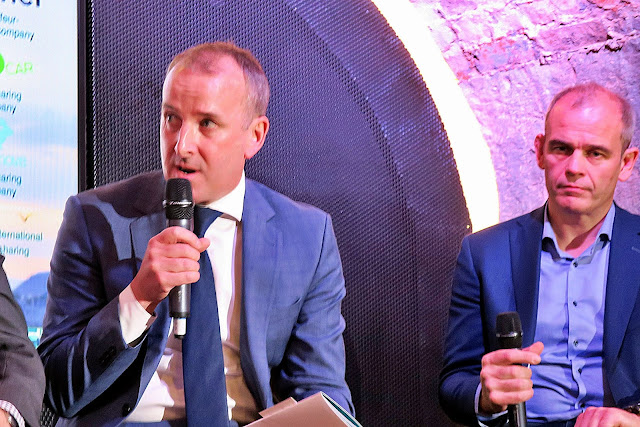Besides, his work at DCU Alpha is about nurturing tech companies focusing on the disruption of various sectors, including transportation.
So saying something like 'car ownership is dead' was not to be unexpected. It may be, like Mark Twain's first obituary, a bit premature. But, eventually, I suspect he's right.
And in the nature of change in these times, eventually can come more quickly than it used to.
At the event held in Dogpatch Labs in Dublin yesterday, Furlong did say that cars and transportation are 'coming late' to the 'disruption tipping point'. "But the speed of the shift is extraordinary. There are really fundamental changes coming. They are inevitable."
In what had to be, in the time available, only a brief overview of what he believes is the near future he forecast 'an explosion of micro-mobility'. That's e-scooters, and more available shared bicycles to you and me. And more car-sharing and ride-hailing (Uber and like, which we don't have here ... yet).
On the shared e-scooters, he said the dockless experience in US cities got bad press, mainly because they were introduced in a 'Wild West' unregulated environment.
That can be fixed. And Irish companies are working on that stuff. Like one of his DCU Alpha enterprises which is developing centimetre-level tracking technology that can be used to control shared micro-mobility users who are breaking the rules.
Car makers will be happy to hear Furlong's statement that much personal transport will still be underpinned by the car. "But not by ownership. We're moving towards a 'servitization' of the car asset. Where mobility moves into the realm of a financial service."
He talked of a 'tokenisation' of the urban transport system which will allow customers to use a variety of ways of getting around, seamlessly, on a subscription basis. "It will create challenges. For municipalities in providing the infrastructure. For politicians."
Ah, yes, for politicians. Changes in planning needed, for instance, to provide for more micromobility facilities than car parking in new city apartment developments. Taxing existing city parking spaces, heavily (Ouch! Motorists' Votes! Ouch!).
"We need a congestion charge (in Dublin) and we need it fast." (Ouch! Motorists' Votes! Ouch!)
Nevertheless, in conclusion the DCU man was adamant that change is coming, and fast. "It's inexorable."
There was more. Journalist Vincent Wall, managing the discussion at the event, wondered how the behaviour and aspirations of the very many car owners would be changed? Colm Brady of the Europcar Mobility Group referred to a survey which showed that young people are more willing to use the options that are coming down the way.
"Private cars spend 95pc of their time parked," he noted. "They are very expensive ways of satisfying transport needs."
His company's fleet of rent-by-the-hour GoCars is now 800, and a high percentage of them have more than 20 drivers each. "We can put 800 more on the road in a year if the demand is there."
He added that according to the survey his company commissioned, there's a strong belief that change will only come from Government action. "We have to vote in governments that will make these happen. It's going to hurt for some, but this has to happen."
Ray Coyne, CEO of Dublin Bus, counselled against trying to ease congestion by providing more road space for cars. "Add another lane for cars and it just fills up with cars. Cut down the space for cars. Give more room for transport that gets the most value in the use of space."
Orla O'Halloran, Intelligent Mobility Engineer with Arup, said authorities should stop thinking about how many cars can come into a city, and think instead about the number of people who can come in by transit. "If you want to change behaviour, you have to use carrot and stick. But individuals have to take responsibility for their choices. There needs to be a lot more investment in alternatives."
Professor David Timoney of UCD, an expert in energy for transportation, cautioned against simplistic analysis, such as suggesting that all the people in individual cars on a stretch of the M50 would be more efficiently accommodated on a few buses. "Each of those people is going on a different journey, so it is not as simple as putting them all into a bus."
Are we there yet?
No. But we're getting there. Where 'there' is, has yet to be decided.








